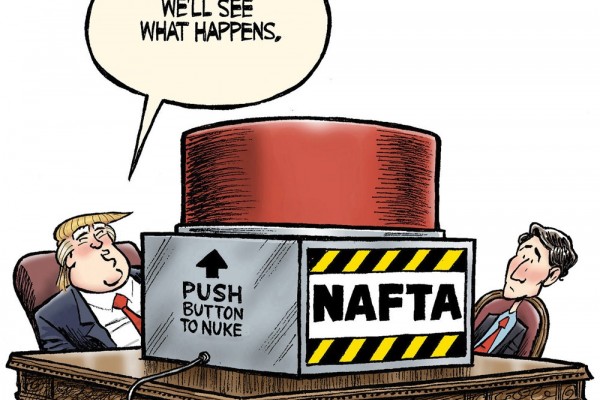Tales from the Below-par Economy
Review: We Don’t Play Golf Here! (and other globalization stories)
Directed by Saul Landau
2007, 33 min.
Available on dvd from roundworldproductions [at] gmail.com
Alexei Nikolov, secretary general of the Russian Golf Association, in 2003 told Knight Rider Newspapers that Soviet leaders prohibited the game of golf because they considered the sport bourgeois and decadent. “They thought it was played only by fat, middle-aged Americans,” Nikolov said.
In this, at least, Lázaro Rodríguez, mayor of Tepoztlán, Mexico, would agree with the Soviets. “We don’t play that sport, here,” says Rodríguez.
We Don’t Play Golf Here!, directed by Saul Landau, is a series of vignettes exposing the impact of globalization on working-class people on either side of the Mexico-U.S. border. The opening story documents the struggle between the people of Tepoztlán and the golf-crazy elites and their developers, who planned to construct an eighteen-hole course, chalets and country club.
The proposed new course, Rodríguez states, would not only sap badly needed water for farming; “The grass … requires maintenance, it would require the use of fertilizers and pesticides … and because of irrigation all that stuff would end up in our aquifer, a worrisome prospect. It wouldn’t be long before we would be drinking that contaminated water.”
In this vignette, the people win, successfully mobilizing against the golf course.
Not every story ends as happily. Several vignettes document how construction of maquiladora factories and the activities of timber companies like Boise Cascade exploit local labour and endanger citizens with their toxic by-products. When the companies leave, their toxic refuse remains behind for someone else to deal with.
The bosses – local and foreign – are inevitably supported by police and armed forces, who use violence and torture to suppress local dissent. As a sociologist from Chihuahua, Victor Quintana, observes, “Capitalist development always results in violence against people, communities and nature.”
Globalization strikes across borders. Another vignette reveals the devastating impact on workers in El Paso, Texas, when garment giant Levi Strauss moved its El Paso plant south of the border.
With We Don’t Play Golf Here!, Landau has produced a moving documentary featuring interviews with residents and local officials, along with diverse footage of ordinary residents going about their lives amidst globalization’s tell-tale markers: chain stores and toxic waste (and some very creative anti-neoliberal graffiti). The doc also features original music by Greg Landau and Omar Sosa.
Soccer, explains Quintana in one of the final vignettes, “is the most democratic sport in the world, where poor countries can beat the rich ones…. Golf is a sport of calculation [while] soccer is all about improvisation.”
Golf is portrayed, here, as a powerful symbol of the global economic order – tightly integrated to the benefit of elite players, but beyond the reach of the great majority. “This golf club in Tepoztlán wasn’t going to be built with the sole intent to hit balls through rolling green hills,” says Andres Barreda, of Mexico City’s Autonomous University. “It was also intended as a power centre, a boys’ club where businessmen would determine the future of the area.”
As Mayor Rodríguez observes, “I think it’s a sport for sick people.”
This article appeared in the Indigenous Lands and Rights issue of Canadian Dimension .








